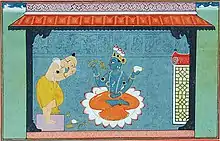
Krishna in his form of Damodar with mother Yashoda at Shri Priyakant ju Temple, Vrindavan
| Part of a series on |
| Vaishnavism |
|---|
 |
Damodar (Sanskrit: दामोदर, IAST: Dāmodara, also spelled "Damodara" and "Damodarah") lit. '"roped around the abdomen"'[1] is the 367th name of Vishnu from the Vishnu Sahasranama. The various meanings of the name are given as follows:
- "The Lord when He was tied with a cord (dāma) around His waist (udara)", denoting a divine pastime in which Krishna's mother Yashoda bound him for being mischievous. (Used by various Vaishnava adherents.)[2]
- "One who is known through a mind which is purified (Udara) by means of self-control (dama)".[3]
- "One in whose bosom rests the entire universe."[4]
Temples
In many temples, Krishna is worshiped as Damodar. Historic temples and sites related to Damodar includes:
In popular culture
A popular bhajan that celebrates Krishna as Damodara is the Damodarashtakam [5](found in the Padma Purana of Krishna Dwaipayana Vyasa, spoken by Satyavrata Muni in a conversation with Narada and Shaunaka.). It is often sung by devotees during the month of Kartika, and is very popular amongst the Vaishnavas of ISKCON.[6]
See also
References
- ↑ www.wisdomlib.org (2015-03-01). "Damodara, Dāmodara, Daman-udara: 26 definitions". www.wisdomlib.org. Retrieved 2022-08-03.
- ↑ "Meaning, origin and history of the name Damodara".
- ↑ "Destroyer of Evil and Epitome of Love - Tales from the Life of Young Krishna". 23 November 2009.
- ↑ "MantraOnNet.com: Vishnu Sahasranaama". Archived from the original on 2011-07-28. Retrieved 2011-03-21.
- ↑ "Damodarastakam". www.krishna.com. Retrieved 3 November 2020.
- ↑ "» Damodarastakam Bhaktivedanta Manor – Hare Krishna Temple". Bhaktivedantamanor.co.uk. Retrieved 3 November 2020.
External links
This article is issued from Wikipedia. The text is licensed under Creative Commons - Attribution - Sharealike. Additional terms may apply for the media files.